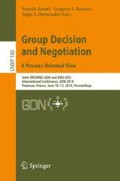Abstract
The starting point of modern social choice theory is the assumption that is the individuals are endowed with complete and transitive preference relations over the set of alternatives. Over the past 60 years a steady flow of experimental results has suggested that people tend to deviate from principles of choice stemming from the utility maximization theory. Especially in choices under risk, this behaviour is quite common. More importantly, this behaviour makes intuitive sense. The usual culprit, i.e. the source of this “deviant” behaviour, is most often found in the violation of transitivity or – under risk – of the monotonicity in prizes principle. We show that there are grounds for arguing that even the completeness principle as well as continuity of preferences may, quite plausibly, be violated.
Access this chapter
Tax calculation will be finalised at checkout
Purchases are for personal use only
Preview
Unable to display preview. Download preview PDF.
References
Aleskerov, F., Monjardet, B.: Utility Maximization, Choice and Preference. Springer, Heidelberg (2002)
Allais, M.: The foundations of positive theory of choice involving risk and a criticism of the postulates and axioms of the American school. In: Allais, M., Hagen, O. (eds.) The Expected Utility Hypothesis and the Allais Paradox. D. Reidel, Dordrecht (1979)
Aumann, R.J.: Utility theory without the completeness axiom. Econometrica 30, 445–462 (1962)
Baigent, N.: Preference proximity and anonymous social choice. The Quarterly Journal of Economics 102, 161–169 (1987)
Baigent, N., Eckert, D.: Abstract aggregations and proximity preservation: and impossibility result. Theory and Decision 56, 359–366 (2004)
Baigent, N., Klamler, C.: Transitive closure, proximity and intransitivities. Economic Theory 23, 175–181 (2004)
Bar-Hillel, M., Margalit, A.: How vicious are cycles of intransitive choice? Theory and Decision 24, 119–145 (1988)
Daudt, H., Rae, D.: Social contract and the limits of majority rule. In: Birnbaum, P., Parry, G. (eds.) Democracy, Consensus & Social Contract. Sage, London (1978)
Dietrich, F., List, C.: A reason-based theory of rational choice. Nous 47, 104–134 (2013)
Eckert, D., Lane, B.: Anonymity, ordinal preference proximity and imposed social choices. Social Choice and Welfare 19, 681–684 (2002)
Ellsberg, D.: Risk, ambiguity, and the Savage axioms. Quarterly Journal of Economics 75, 643–669 (1961)
Fishburn, P.C.: The irrationality of transitivity in social choice. Behavioral Science 15, 119–123 (1970)
Gilboa, I., Schmeidler, D.: A Theory of Case-Based Decisions. Cambridge University Press, Cambridge (2001)
Harsanyi, J.C.: Rational Behavior and Bargaining Equilibrium in Games and Social Situations. Cambridge University Press, Cambridge (1977)
Lichtenstein, S., Slovic, P.: Reversal of preferences between bids and choices in gambling decisions. Journal of Experimental Psychology 89, 46–55 (1971)
Machina, M.: Expected utility analysis without independence axiom. Econometrica 50, 277–323 (1982)
May, K.O.: Intransitivity, utility, and the aggregation of preference patterns. Econometrica 22, 1–13 (1954)
Mongin, P.: Does optimization imply rationality? Synthese 124, 73–111 (2000)
Nermuth, M.: Two-stage discrete aggregation: the Ostrogorski paradox and related phenomena. Social Choice and Welfare 9, 99–116 (1992)
von Neumann, J., Morgenstern, O.: Theory of Games and Economic Behavior, Sixtieth Anniversary Edition. Princeton University Press, Princeton (2007)
Savage, L.: Foundations of Statistics. Wiley, New York (1954)
Tversky, A.: Intransitivity of preferences. Psychological Review 76, 31–48 (1969)
Author information
Authors and Affiliations
Editor information
Editors and Affiliations
Rights and permissions
Copyright information
© 2014 Springer International Publishing Switzerland
About this paper
Cite this paper
Nurmi, H. (2014). Making Sense of Intransitivity, Incompleteness and Discontinuity of Preferences. In: Zaraté, P., Kersten, G.E., Hernández, J.E. (eds) Group Decision and Negotiation. A Process-Oriented View. GDN 2014. Lecture Notes in Business Information Processing, vol 180. Springer, Cham. https://doi.org/10.1007/978-3-319-07179-4_21
Download citation
DOI: https://doi.org/10.1007/978-3-319-07179-4_21
Publisher Name: Springer, Cham
Print ISBN: 978-3-319-07178-7
Online ISBN: 978-3-319-07179-4
eBook Packages: Computer ScienceComputer Science (R0)

